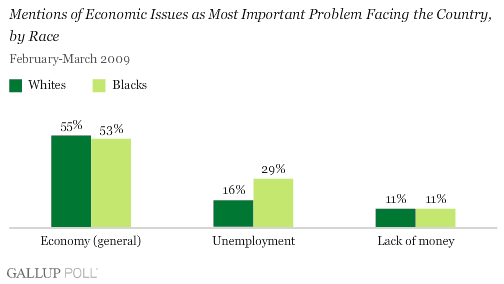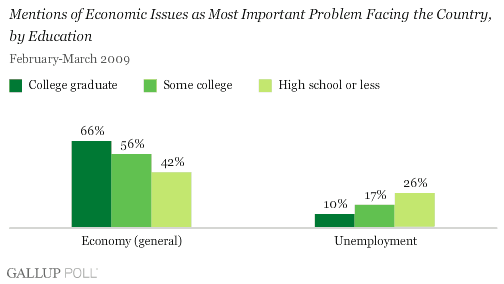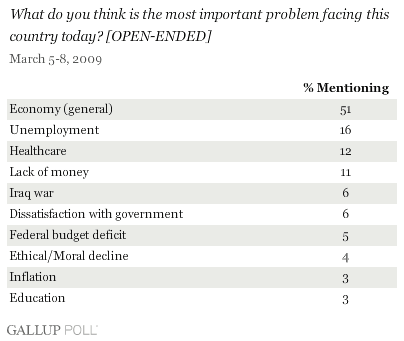PRINCETON, NJ -- While the vast majority of both blacks and whites name at least one economic issue as the most important problem facing the country, they differ in the extent to which they specifically mention unemployment, with jobs a much greater concern among blacks (29%) than among whites (16%).

This is based on aggregated data from Gallup's "most important problem" question from February and March. Economic issues have dominated the responses to this question for much of the past year, and over the two months, an average of 83% of Americans named some economic concern as the United States' biggest problem.
The black-white differences on unemployment concerns are consistent with government reports that historically have found a much higher unemployment rate among blacks than among whites.
In addition to blacks, Americans with less formal education also show a heightened concern about the job market. Over the last two months, an average of 26% of Americans with a high school education or less have named unemployment as the nation's most important problem, compared with 17% of those who have attended college but not completed it and only 10% of college graduates.
By comparison, those with more formal education tend to focus their concerns on the broader economy.

Democrats (20%) and independents (20%) differ somewhat from Republicans (14%) in the extent to which they name unemployment as the most important problem.
There are modest party differences on other issues -- mostly between Republicans and Democrats -- such as healthcare (11% Democratic, 5% Republican), the federal budget deficit (7% Republican, 2% Democratic), and moral and ethical decline (7% Republican, 1% Democratic).
March Update
In the March monthly update, from a March 5-8 ���۴�ýPoll, 80% of all Americans name at least one economic issue as the nation's top problem, with the most common being the economy in general (51%), unemployment (16%), and a lack of money (11%). In addition, 12% name healthcare, 6% the war in Iraq, and 6% dissatisfaction with government.

The percentage naming the Iraq war is the lowest since August 2003, when 5% did so. It was the most commonly mentioned issue each month from April 2004 through January 2008.
The 12% who mention healthcare is up from 6% the prior month, aided by President Obama's healthcare initiative, announced as the poll was being conducted.
Survey Methods
Results are based on telephone interviews with 1,012 national adults, aged 18 and older, conducted March 5-8, 2009. For results based on the total sample of national adults, one can say with 95% confidence that the maximum margin of sampling error is ±3 percentage points.
Results for the subgroups are based on aggregated data from the Feb. 9-12 and March 5-8 polls, consisting of interviews with 2,034 total national adults.
Interviews are conducted with respondents on land-line telephones (for respondents with a land-line telephone) and cellular phones (for respondents who are cell-phone only).
In addition to sampling error, question wording and practical difficulties in conducting surveys can introduce error or bias into the findings of public opinion polls.
